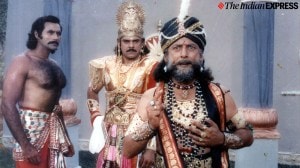Salman gets 5 yrs for chinkara as blackbuck shadow stalks him too
The District & Sessions Court, Jodhpur, today upheld a lower court’s order sentencing actor Salman Khan to five years rigorous imprisonment in the chinkara poaching case.

The District & Sessions Court, Jodhpur, today upheld a lower court’s order sentencing actor Salman Khan to five years rigorous imprisonment in the chinkara poaching case.
Khan, who was not present in court and faces a non-bailable warrant, was untraceable for most of the day but was seen waving to crowds outside his house in Mumbai in the evening. His lawyer Dipesh Mehta said Khan would surrender and also move the high court on Monday.
But there could be much more for Khan to face. The chinkara case is just two of the four cases that were filed against him after he spent three days on a hunting expedition with friends in the forests around Jodhpur during the shooting of Hum Saath Saath Hain in October 1998. He is alleged to have killed two chinkaras and two blackbucks over three days.
The forest department feels it will be able to build a watertight case against him in the blackbuck case, which comes up for hearing later this month in Jodhpur High Court. And eyewitnesses in this case, who are from the Bishnoi community, are unflinching, in sharp contrast to those in the chinkara case.
The blackbuck case was filed on the basis of complaint from two men of the Bishnoi community who saw spotlights and heard sounds of gunfire. According to their statements, they followed Khan’s vehicle and saw him shoot the blackbuck. They filed a complaint with the local forest department, based on which raids were conducted in the hotel at which the film crew was staying.
When the trial court issued a chargesheet in 2002 on the blackbuck case, Khan went to sessions court, which overturned the charges under the Arms Act. Now the government has filed for a revision petition in high court asking for charges under Arms Act to remain, for without those charges, the case could weaken. A pistol and a gun had been recovered from Khan with licenses that were not valid for Rajasthan.
The blackbuck case has also had its share of twists and turns but officials of the forest department say they have been able to build a sound case. The case had weakened when a local veterinary doctor mislead the investigation, saying that the blackbuck had died because of ‘overeating’.
But the carcass was exhumed and a DNA sample was taken to the Centre for Cellular and Molecular Biology in Hyderabad. It was established that the carcass was that of a blackbuck and that it had been killed and not died a natural death.
The forest department is now waiting for the verdict of the high court on the Arms Act. The final trial will then start in the sessions court.
In another case of chinkara poaching by Khan, the government has already appealed against the one-year sentence awarded to him.
As these cases drag on, it is more a question of patience and perseverance rather than legalese. So far, the Rajasthan forest department is clearly not letting the cases get lost in the legal wrangles.
Khan is also under trial for killing a person sleeping on a pavement in Mumbai while driving drunk in 2002. He has denied being at the wheel.





- 01
- 02
- 03
- 04
- 05


























